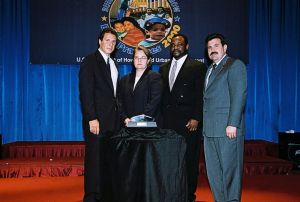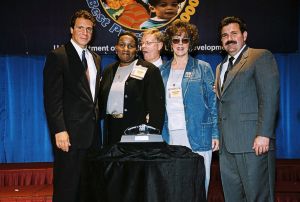 |
2000 Best Practice Awards
Best of the Best Winners: New Jersey
Best Practice: Brother to Brother: Isaiah
House Residential Program
HOMELESS BOYS IN NEW JERSEY HELPED BY
BROTHERS WITH BROTHERS
East Orange, New Jersey. Young male runaways in Essex County found few shelters
open to them until Isaiah House opened its Residential Program for Adolescent
Boys in 1996. Called Brothers with Brothers, the program supports 14 homeless
inner-city boys aged 15 to 19 with housing, meals and full social, emotional
and recreational services for up to four years.
Working with a population that few projects
assist, the program has succeeded by drawing on the strengths of the boys,
rather than trying to correct their deficiencies. “We found that if
we trust them, they act trustworthy,” says Glenda Kirkland, the |

Glenda Kirkland and Richard Green receiving
Best of the Best award from Secretary Cuomo (l) and Deputy Secretary Ramirez
(r) |
project’s executive director. Contributing
to the program’s success was commitment from the city of East Orange,
which donated an abandoned apartment building that now houses the program,
and operational funds from HUD through a Supportive Housing Grant.
The boys must attend school or a job-training
program. An average of two residents per year enter four year colleges while
their peers move on to self-sustaining jobs and other independent living
programs. Through board members who are executives at United Parcel Services
Corp., many of the young men have obtained part time positions that develop
into full-time jobs upon completion of high school. The program accepts
referrals from the State Division of Youth and Family Services. A professional
staff, community mentors and volunteers provide a family atmosphere that
allows the young men to develop into self-supporting, contributing citizens
of the community.
The young men occupy an entire floor in the
renovated building that houses Isaiah House administrative offices and other
family service programs. Two young men share a room, have access to a lounge
day room, a television room, study areas, a computer lab and an indoor gym
and recreational area with weights, 2000 HUD Best Practices 6 The 100 National
Winners punching bags and other athletic equipment. Each boy is given a
full membership to the nearby YMCA. Residents share outings from sailing
to trips to the stock market in two vans donated by the state.
This population is perceived to be difficult
to help, but program staff found the perception does not match reality.
“We have had a tremendously good experience working with them,”
says Kirkland. Neighbors occasionally call to ask whether residents contributed
to local problems, yet staff investigations have not found any related to
the residents. The young men’s respectful behavior in the community
is helping build a solid track record.
Isaiah House raised more than $2.7 million
to renovate the donated building, including funding from East Orange, the
New Jersey Department of Community Affairs, the Bank of New York, UPS Corporation,
HOME and HOPWA programs, the Federal Home Loan Bank, New Jersey Housing
and Mortgage Finance Agency, Local Initiatives Support Corp. and numerous
foundations and private individuals. Funds from the State Division of Youth
and Family Services supplement a HUD Supportive Housing grant that sustains
program operations.
Maturiting from youth to adult remains the
program objective, according to Executive Director Kirkland. “We believe
in reaching deep rather than spreading thin,” she says, noting that
many boys have been with the program since its inception in 1996.
The New Jersey Division of Youth and Family
Services now licenses the program as a residential child care facility.
Research and protocol materials and a statistical database system that track
results are available from the program’s executive director.
Contact: Ms. Glenda Kirkland, Phone: (973)678-5882 Ext.3003
Tracking Number: 643
Winning Category: Program (Community Planning and Development) |
Best Practice: New Jersey Housing and Mortgage
Finance Agency Home Ownership for Permanency Program
Partnership Creates First of Its Kind
Project to Reduce Number of Special Needs Children in Foster Care
Trenton, New Jersey. New Jersey has now placed homeownership within the grasp
of more families seeking to provide permanent homes for children in foster
care. The Home Ownership for Permanency Project creates affordable home
ownership opportunities for low-and moderate- income potential adoptive
families and relative caregivers to reduce the number of special needs children
in foster care.
This $4 million project is the first of its
kind to address the needs of lower income adoptive families and was created
through a partnership of the New Jersey Housing Mortgage Finance Agency
(NJHMFA) |

Debra DiSantis/Gregory Adkins receiving Best
of the Best award from Secretary Cuomo (l) and Deputy Secretary Ramirez
(r) |
and the New Jersey Department of Human Services,
Division of Youth and Family Services (DYFS). The Catastrophic Illness in
Children Relief Fund Commission provided half of the program funding through
a $2 million matching grant.
Under the Home Ownership for Permanency Project,
NJHMFA provides homebuyer mortgages at below market interest rates of 1%
to 4%, with 100% financing if needed, for low- and moderate-income adoptive
parents and relative caregivers faced with inadequate or unaffordable housing.
Financing for home improvements, rehabilitation and refinancing to enhance
or enlarge a current home to accommodate new family additions is also available.
The children adopted through DYFS are mainly children who were removed from
their birth parents due to abuse or neglect. Many of the children have special
needs, such as behavioral and emotional problems or developmental disabilities.
Some have physical disabilities as well.
The program abandons the common assumption
that HUD must increase funding in order to foster programs. This initiative
requires no new HUD funds but instead relies on making better use of funds
available from other sources, including private investment, to increase
housing opportunities for special populations. This program modernizes the
outdated procedure of creating program silos or categorical grants with
a more contemporary approach of adding incentives for merging housing and
non-housing program ideas consistent with HUD goals.
Contact: Gregory Adkins, Phone: (609) 278-7457
Tracking Number: 2694
Winning Category: Program (Housing - Single Family) |
Best Practice: Regional Opportunity Counseling
Program
Housing Counseling Program Helps Low-Income
Families Relocate
East Orange, New Jersey. The state of New Jersey’s Regional Opportunity
Counseling Program helps low-income renters by increasing the number of
housing units available to them and helps landlords by providing them with
responsible renters. The program expands landlord participation, increases
the diversity of neighborhoods where Section 8 recipients reside, encourages
low-income families to move to low-poverty areas, identifies and addresses
barriers to mobility and provides in-depth counseling to participating families.
The counseling program has enabled 37 low-income
families to relocate to more |

Fran Lawton/Roy Zigler/Jackie Grabine receiving
Best of the Best award from Secretary Cuomo (l) and Deputy Secretary Ramirez
(r) |
racially and economically diverse areas that
provide them with access to better schools and greater employment opportunities.
More than 250 families have been counseled since the program’s inception
in March 1998. More than 100 land-lords have agreed to participate in the
program, and 25 landlords have attended workshops on the state’s weatherization
program and upgrading of properties.
Although the program operates with limited
staff, it partners with public and private entities to address the needs
of both Section 8 participants and landlords traditionally reluctant to
participate in the voucher program. The state’s University of Medicine
and Dentistry developed “Good Housekeeping” videotapes and an
extensive class curriculum to train public housing residents and Section
8 participants in how to become better housekeepers. Essex County College
provides access to job information, training programs and other relevant
courses for participating residents. Proctor and Gamble supplies written
materials. Home Depot has conducted workshops on modifying venetian blinds
and maintaining floors and kitchen and bathroom fixtures. La Casa de Don
Pedro provides job training and apprenticeships. Rutgers University has
set up a database system to analyze data provided by the state and the two
participating housing authorities to determine where Section 8 residents
live. The Essex County Division of Community Action supplies information
on how residents can obtain money for bills when they cannot afford to pay
them.
The program is so successful that numerous
inquiries have come in from similar programs in Delaware, Texas, Pennsylvania
and Louisiana. The program’s director has received a number of requests
to present an overview of the program at various housing-related conferences.
Contact: Fran Lawton, Phone: (973) 266-8692
Tracking Number: 295
Winning Category: Program (Fair Housing and Equal Opportunity) |
Return to Best
Practices 2000 Best of the Best Winners
Content Archived: April 20, 2011 |